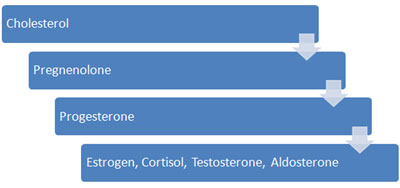Estrogen Therapy Side Effects: What You Need to Know

Any medical treatment has pros and cons, and that is why you need to understand estrogen therapy side effects.
Hormone replacement therapy is just that – a way to increase hormone levels after they decline. Unfortunately, not all methods of HRT are equal in their functions, results, and safety.
Three early studies provided essential information about risks from estrogen and estrogen/progestin treatments:
- The Women’s Health Initiative (WHI)
- Heart and Estrogen-Progestin Replacement Study (HERS)
- Postmenopausal Estrogen/Progestin Interventions Trial (PEPI)
HERS studied women with prior heart attacks. The goal was to see if estrogen in conjunction with progestin could lower a secondary coronary event risk. The result was an increased risk of heart attack over four years. Blood clots in legs and lungs also increased.
PEPI examined solo estrogen therapy for heart disease and bone mass and found no increased risks.
The WHI study had many pitfalls. Women receiving only estrogen began the study with a higher cardiovascular disease risk than the ones in the estrogen/progestin study. Synthetic progestin rather than natural progesterone was used in the study.
As we examine the risks and side effects of estrogen replacement therapy, you will have the information you need to decide if this treatment is right for you.
Common Estrogen Therapy Side Effects
Doctor prescribed estrogen replacement therapy side effects are typically mild if they do occur. Most females are excellent candidates for estrogen treatment to combat menopausal symptoms.
If you do experience side effects of estrogen therapy, it is best to contact your prescribing doctor. Adverse reactions typically improve within three months.
| Common estrogen therapy side effects that are not particularly dangerous include: | |
|
|
| Less common estrogen side effects include: | |
|
|
| Report the following rare estrogen side effects to your doctor immediately: | |
|
|
When it comes to the more serious risk factors of estrogen therapy, the WHI study found the following:
- Stroke risk increase of 39 percent
- Blood clot risk increase of 47 percent
We also want to present information from The National Institute for Health Care and Excellence (NICE) from the UK [1, 2]:
- Estrogen alone decreases the risk of:
- Coronary heart disease
- Breast cancer
- Bone fractures
- Blood clots – no increased risk from patches or gel
- Stroke – estrogen tablets have a slight increase in risk
Oral forms of hormone replacement tend to go to the liver. HT Medical Center doctors rarely prescribe oral preparations of hormone therapy.
Side Effects from Combined Progestin and Estrogen Therapy
Progestin side effects are relatively the same as with estrogen, although depression, acne, and abdominal pain are other possibilities.
The most significant concerns that came out of the WHI study were for those women who received estrogen plus progestin. It is also important to point out the difference between progestin (used in the study) and progesterone:
- Progestin – a synthetic form of progesterone that provides many of the same benefits as progesterone. The body does not recognize progestin as natural and must convert it before use. Progestin carries many risk factors.
- Progesterone – bioidentical to the body’s natural progesterone. Readily recognized as natural progesterone and immediately used with little to no risks.
Does estrogen therapy have side effects when used with progestin?
Yes, there are increased risks for women who use a combination estrogen/progestin treatment [1]:
- Breast cancer risk increases 26 percent
- Blood clot risk doubles
- Heart attack risk increases 29 percent
- Stroke risk increases 41 percent
Since progestin can help protect against uterine cancer, hormone doctors recommend using bioidentical progesterone to avoid progestin/estrogen therapy side effects.
How to Avoid Estrogen Therapy Side Effects
As with any form of hormone replacement therapy, doctor supervision is mandatory. The best way to avoid side effects of estrogen therapy for menopause is to contact a hormone specialist. We know that many women first think of their gynecologists for treatment. Unfortunately, not all physicians keep up to date with the latest findings in hormone therapy for older women. Estrogen and progestin are not always the best options.
Do not begin estrogen or even estrogen and progesterone (yes, natural bioidentical) without first undergoing blood testing. A hormone specialist will analyze your estradiol, progesterone, testosterone, and growth hormone levels to determine the best treatment for your needs.
Today, many women are choosing the safer testosterone therapy that naturally helps increase estrogen levels.
Remember, you should not use estrogen therapy if you have any of the following conditions:
- Heart disease
- Blood clots
- Breast, endometrial, or uterine cancer
- Stroke
- Liver disease
Testosterone replacement therapy is generally considered safe in many women who are not estrogen candidates.
To speak with a hormone specialist about estrogen therapy side effects and recommended treatment options, please contact HT Medical Center for a free consultation.

















